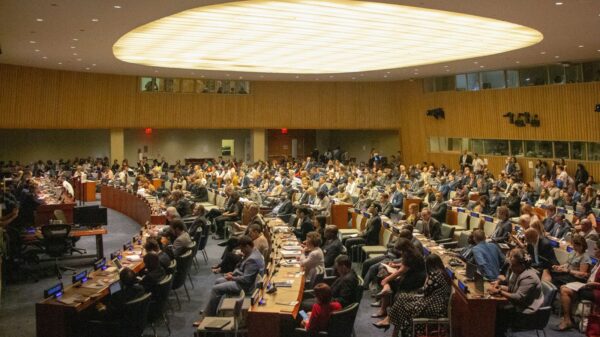
The spirit of graduation is ablaze on Howard’s campus. As we walk past the Yard, we see students posing for graduation pictures, excited chatter about what to wear for commencement can be heard in the hallways and the question, “What are you doing after graduation?” is at the tip of everyone’s tongue.
Like the legacy we have witnessed, I am confident that the class of 2024 will set out for great achievements, bringing real change in the world around us.
As students in 2024, we recognize the influence of our choices. Whenever possible, we strive to make ethical decisions, understanding the significance of where our money goes and the power we hold as consumers in today’s society.
While there is no ethical consumption under capitalism, the choice we try to make is usually the lesser of two evils. It is usually a question of whether we want to support a fast-fashion company that exploits children or exploits labor in the global south. There is no winning as a consumer and it can often leave us feeling defeated.
The feeling students now have as consumers only extend further as they enter the workforce, in this economy where, according to the Federal Reserve, the U.S. unemployment rate is the lowest it has been in decades. The market is still harsh with inflation and productivity still recovering after the pandemic.
Many tech companies have even instilled hiring freezes and cuts since the massive layoffs that happened in 2022. The job market feels especially fragile right now, as some industries continue to grow more than others while wage growth needs to be up to speed.
Anu Upadhyay, a senior computer science engineering major from Nepal, shared her feelings about graduating.
“While I had always planned on going to grad school straight out of college, many of my friends, especially international students, have been struggling to get a job despite their outstanding achievements,” she said. “Most of us are looking for any alternatives possible because of how hard the job market is.”
With all these uncertainties within the economy, many graduates feel lucky if they can get a job as they approach graduation. However, students may face ethical dilemmas as they consider whether to compromise their morals for a stable future.
As new graduates who are aware of the power of our choices, holding corporations accountable is an extremely important step. Similar to the choices we make as consumers, we also face choices about who to work for and the practices we support through our labor. The choice, more often than not, does not exist.
While we have to compromise our morals for a stable future, food on our tables, and proper access to healthcare, giant corporations are the passive players in the narrative of capitalism. These corporations place the blame on individuals and consumers rather than actively setting standards for themselves. This blame game has gone on for decades in our society.
The solution would start from the ground up, advocating for better regulatory laws that enforce ethical standards across all companies can level the playing field. The need to foster a culture of transparency and accountability within industries could also pressure corporations to improve their practices, this is where unions can come into play. Allowing employees to unionize can help put forward mutual concerns along with securing wage rates, which will help address the concerns of employees when it comes to standing up for causes. If the notion of change does not sound as promising, the booming gig economy can also be an option for fresh graduates.
According to the Internal Revenue Service (IRS), the gig economy is an activity where people earn income by providing on-demand work, services, or goods. This market is filled by independent contractors and freelancers. According to a report by McKinsey and Company, in 2022, independent workers represented 36 percent of the U.S. workforce. This number is only expected to grow as Gig workers are expected to make up more than 50 percent of the US population by 2027.
The gig economy allows for flexibility and autonomy for workers, helping them choose to work for companies that align more closely with their values, there are also fewer limitations so workers can explore work across various sectors and roles.
As fresh graduates, the barriers to entry are also minimal making it easier to build their way up without compromise, they can also make sure to work in industries that support their mission rather than diminishing it. It is also cheaper for corporations, as it allows them to cut costs that would come from hiring full-time employees.
However, the gig economy does not come without its complications. Dr. Savannah Pearlman, a lecturer at Howard’s Department of Philosophy highlighted the complications of the gig economy.
“The gig economy has allowed for flexibility, but the result is that workers are treated as contractors rather than employees,” he said. “Independent contracts do not have access to traditional benefits like healthcare, paid leave, or 401ks.”
Participating in the gig economy leads workers to the same predicament as we discussed before. As a recent graduate, a steady paycheck and job security from a traditional job would probably be better in the long run.
The gig economy can also feel isolating, as it promotes a more individual work cycle over the traditional communal feel of a workplace, further isolating fresh graduates who already feel like they have lost a sense of community. So, how do we choose to remain ethical in this economy? The answer is we cannot. But we can try and do the most good possible within our means.
Effective altruism is a movement based on answering the question, “How can we best use our resources to help others?” While we could do our best to try not to support corporations that do not match our ideals, there are some other steps we can take through Effective altruism.
“Effective altruism is a movement of people who are interested in doing the most good possible – often by securing high-paying jobs and donating money to highly effective charities,” Pearlman said.” While this might not clear one’s conscious so-to-speak, students can be reassured by the fact that another person would have that job if not them, and that person would be unlikely to do their salary – so really they are doing a good thing in the grand scheme.”
Pearlman also recommended an Effective altruist-approved job board called 80,0000 Hours Job Board that can be used as a “cheat sheet” to ethical jobs, helping students look for jobs that can help tackle the world’s pressing problems.
While these solutions might not be complete solutions to our concerns today, they help reach a common ground, putting us in the position to do the most good within our means.
As a final note to the graduating class of 2024, it can be said with absolute certainty that they will be the catalyst for change in our society, choosing to do better whenever they are in the position to do so.
While the journey is not going to be easy, as the class steps out of the Howard University campus as empowered and educated students, they can leverage their education and voices to advocate for a better world around us.
Copy edited by Alana Matthew













